April 16, 2025 | 13:12 GMT +7
April 16, 2025 | 13:12 GMT +7
Hotline: 0913.378.918
April 16, 2025 | 13:12 GMT +7
Hotline: 0913.378.918
According to Dr. Phan Viet Ha, Deputy Director of the Central Highlands Agro-Forestry Science and Technology Institute, in addition to land and water degradation, climate change, and unsustainable transformation, the agricultural sector in the Central Highlands has many limitations in its unsynchronized application of scientific and technological advances to production.
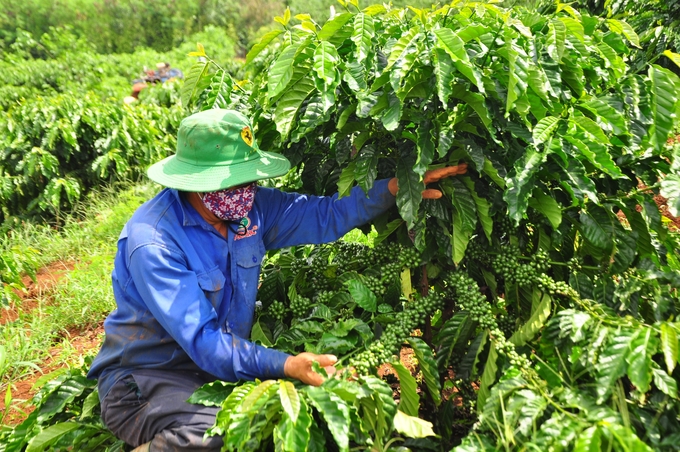
Coffee is a key crop of the Central Highlands, which requires a definite solutions to develop sustainably.
According to a survey compiled by the Central Highlands Agro-Forestry Science and Technology Institute over the years, despite the dissemination of technical procedures, at least 60% of the coffee farmers and 45% of the pepper farmers use fertilizers incorrectly and disproportionately; and 70% of farmers applied chemical fertilizers at doses higher than the recommended one and compared to the yield achieved. When the price of coffee and pepper agricultural products was high, the majority of the farmers use stronger chemical fertilizers with the desire to achieve maximum productivity and income. The percentage of farmers interested in using organic fertilizers is still low, accounting for only 40%.
In addition, with the rising dangers of climate change and the diversity of pests, farmers have used chemical pesticides with increasing numbers and types; they spray with concentration, dosage, and frequency higher than the recommended level, especially during which agricultural prices are high. This leads to poverty in biodiversity; an imbalance in natural enemies; a disruption in the balance of microorganisms in the soil; many new harmful organisms are introduced to the soil and plants. As a result, the soil became polluted, degraded, and lost productivity.
On the other hand, the level of agricultural production management is limited, value chain linkages are difficult, and added value is low. With its position as a staple and traditional crop, the organization of coffee production in the Central Highlands is mainly small-scale and fragmented production. Nearly 90% of the coffee area is grown, cared for and managed by farmers on their own.
Therefore, the harvesting and preliminary processing stages are disconnected, causing difficulties in quality control. Only 10% of the coffee production area is currently concentrated in specialized farming areas, managed by units under the Vietnam Coffee Corporation, coffee companies in the province and private businesses.
The value chain also faces difficulties in offloading output products. Businesses and farmers fail to negotiate and compromise when market prices fluctuate. In addition, agricultural products are exported raw, not only with low added value, but the domestic and international competitiveness level of these agricultural products is poor. The branding for key agricultural products has not been the focal points of local governments. The application of science and technology in the production, preservation and processing of agricultural products is uncommon.
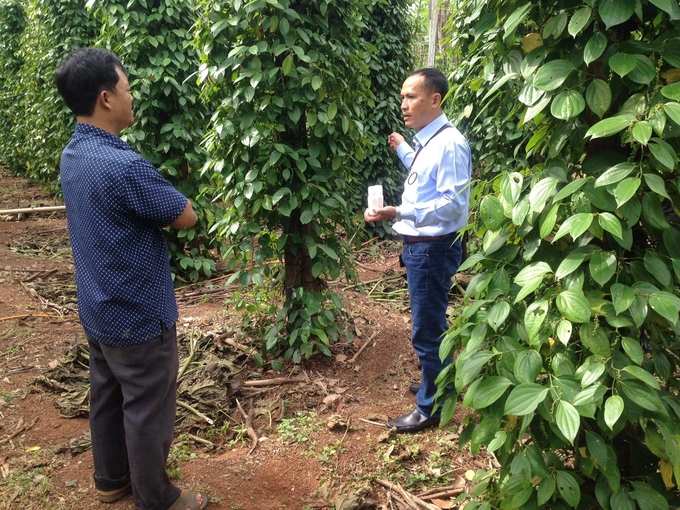
The organic pepper model helps bring high economic efficiency.
To help the Central Highlands' agricultural sector develop sustainably and bring high economic efficiency, Dr. Phan Viet Ha suggests stakeholders to deploy a synchronous and effective technical solution package.
Namely, to plan the area of production linkages, land use types based on natural strengths, production linkages using an agricultural landscape approach based on 4 basic principles of organic agricultural production. These include is health, balance, equity and prudence: it is necessary to orient the development and planning of agricultural production areas with emphasis on biodiversity, natural and human components in regions with ecological and economic reciprocity to aim towards circular agriculture.
“In agricultural planning, we need to focus on large production areas and watersheds instead of administrative landmarks. Each region must be comprehensively assessed in terms of soil fertility, ecological conditions, environmental stability, and the current state of hard and soft infrastructure for production, in order to make appropriate recommendations on types of crops or plant groups for intercropping and farming methods corresponding to each type of soil”, shared Dr. Pha Viet Ha.
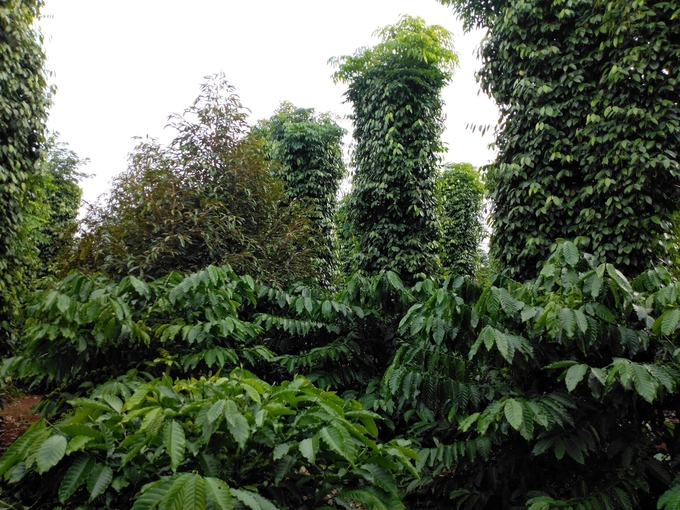
Cultivating coffee in the direction of landscape ensures economic benefits and sustainable development.
Additionally, the accompanying technical requirements need to specify measures to protect the soil and prevent erosion such as mounds, ditches, green manure dressings, terraces, arrangement of crop systems and crop rotation. For places with high risk of erosion such as sloping land, sloping tops, it is necessary to plan them for reforestation and afforestation. In addition, it is necessary to plan all the infrastructure necessary for production such as lakes and dams, processing workshops, warehouses and systems for supplying input materials, product trading and consumption systems, etc.
According to Dr. Phan Viet Ha, it is necessary to have a soft infrastructure, i.e: the policies and regulations with the participation of the stakeholders to ensure that the planning will be properly implemented. The Ministry of Agriculture and Rural Development currently has a project to develop coffee following the landscape approach for provinces in the Central Highlands. This is a very important step for local governments, in coordination with specialized agencies at all levels and farmers, to build sustainable agricultural production models. These models can then be replicated and expanded to the entire region.
“In addition, the Central Highlands must connect with the entire country as well as the world. Overcoming limitations in connection infrastructure, agricultural infrastructure, small-scale production, rudimentary processing, lack of high-quality human resources, slow technological innovation, etc. can create an agricultural ecosystem and a healthy investment environment to attract big businesses to the Central Highlands”, said Dr. Phan Viet Ha.
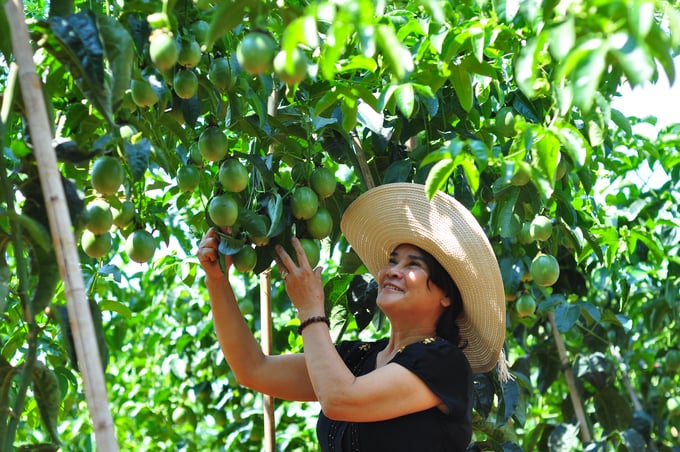
Passion fruit is a strong crop in the Central Highlands, bringing high economic value.
Stakeholders need to synchronously apply technical advances combining precision agriculture and natural agriculture. These are the basic foundations for production to develop reasonably and flexibly for each type of land use in accordance with local conditions and landscape location based on production and conservation criteria. Many technical advances based on the conservation and restoration of soil and water ecosystems have been researched and put into production.
Farmers need to implement an advanced and economical irrigation process according to drip irrigation technology or localized rain spray in combination with fertilizing through water; apply fertilization techniques according to soil fertility and actual yield; use fertilizers, biotechnological plant protection drugs, and nano-products in production and so on. Moreover, natural and organic farming methods are also being studied and assessed to support soil restoration such as minimalist weeding; using biochar to improve soil pH levels; Accurate irrigiation based on the amount of evapotranspiration of the farm, etc.
For mainstream crops that require strict food safety standards such as coffee, pepper, and fruit trees, it is necessary to develop an organic product segment to create high-quality products that are clean and safe according to international standards. This is also a step forward in developing regenerative agriculture, sustainable circular agriculture, and reducing emissions in line with Vietnam's COP26 commitments.
Dr. Phan Viet Ha commented: “For the development of organic crops, the process of intercropping requires economic and biological reciprocity, pests and diseases prevention, beneficial organisms support, soil fertility improvement, strengthening the production system's resistance; using techniques that promote the natural decomposition of organic compounds, green composting, and composting to replace nutrients taken from previous crops; Using water without residues of pesticides and chemical fertilizers for irrigation; Avoid using pesticides of chemical origin and synthetic chemical fertilizers. However, the development also needs to have a clear orientation on the area and market for the product. In addition, the system of legal documents, standards and regulations on organic agriculture needs to be reinforced and approved internationally.
Translated by Nguyen Hai Long
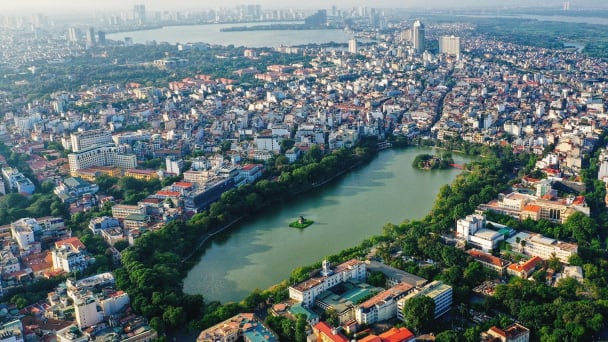
(VAN) After the merger, key leadership personnel of the provinces must consult with the General Secretary, key leaders, and the Standing Secretariat.
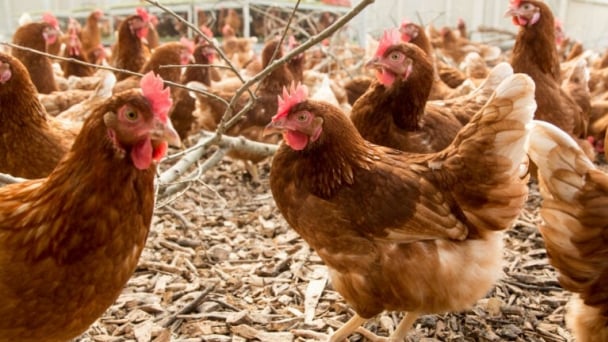
(VAN) The latest Business Benchmark on Farm Animal Welfare (BBFAW) reveals steady progress on farm animal welfare across the global food industry.

(VAN) Green credit is a financial policy that effectively supports environmentally friendly projects and activities today.
/2025/04/09/1049-2-165919_630.jpg)
(VAN) With a revenue of less than VND 30 billion/year, packaging producers are exempted from EPR liability under Decree No. 05/2025 newly issued.
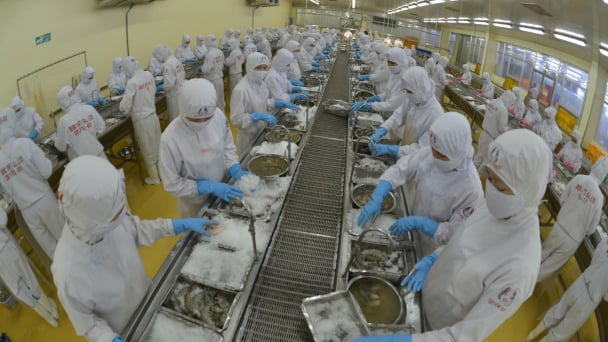
(VAN) Ministry of Agriculture and Environment has issued an Action Plan for sector's development in the coming period, aiming for a growth rate of 4% or higher and an export turnover of USD 65 billion.

(VAN) The 177th Session of the FAO Council opened on Monday at the Organization’s headquarters in Rome.
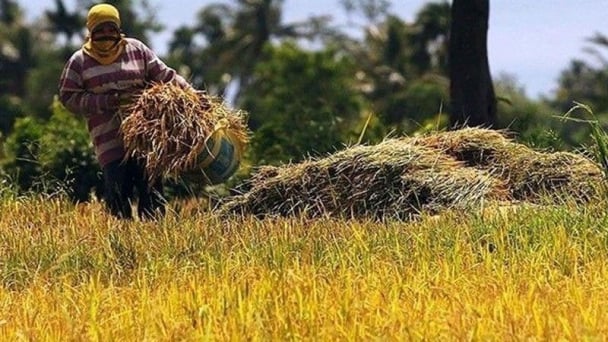
(VAN) In a statement, the Federation of Free Farmers (FFF) said the government must not be complacent over the reciprocal tariffs even if the Philippines will be slapped with the second lowest rate among US trade partners.